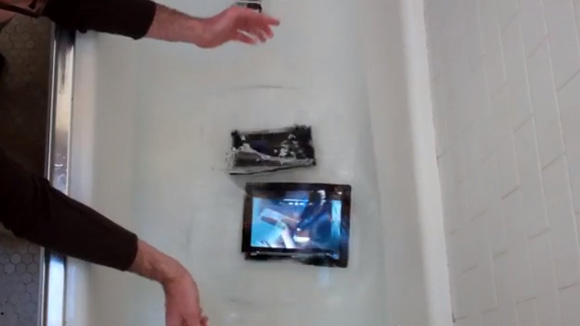Do device repairability scores and drop tests matter?
Or are they just good for a voyeuristic cringe?
The CEA each year hosts the massive CES tech convention in Las Vegas. As an industry advocacy group, CEA might have some programs in place to educate or inform consumers about the best way to handle device repairs, or so we thought. Koenig said that's not the case.
"I think our position is that consumers should first start with contacting the retailer or manufacturer about [whether] a product is malfunctioning or damaged to investigate repair options," he said.
"In a lot of cases, if you avoid that route or don't take that path you will void your warranty."
Electronics makers want to be in control of repairs because of quality concerns as well as not being held responsible for faulty devices repaired at home or by third parties, he explained. This only intensifies over time as electronics become ever more complex.

"We're not talking about gears and cogs and belts," Koenig said. "We're talking about microelectronics that are very, very sophisticated and require a high degree of skilled labor to repair properly."
In a recent consumer survey, the CEA found that warranty concerns had an impact on electronics purchases for 75 percent of people born between 1965 and 1980, 64 percent of consumers from the period 1981 to 1994, and 54 percent for those born from 1995 to 1999.
The survey also asked about factors like overall device quality, price, and features. Reparability wasn't even an option for respondents to choose.
Sign up for breaking news, reviews, opinion, top tech deals, and more.
But Koenig said he feels comfortable inferring from the data regarding consumers' warranty concerns (or lack thereof) that consumers aren't currently too concerned about device repairs, either.
"The data doesn't say that, but that's what I would read from these findings," he said, adding that these days phone users are likely to simply buy a new device rather than have a broken one repaired or try a DIY repair.
Skirting disaster
So ultimately, is anyone paying attention to the repair scores and drop tests and warranties? Yes, of course. But the question of who and how many remains murky.
iFixit and Square Trade swear each is making a difference, and the groups very well may be. iFixit in particular even seems to have a noble agenda: slowing the consumption of the planet's resources by encouraging consumers to buy easily repaired devices and repair their electronics themselves or have them repaired rather than buying new ones.
"For quite a while we've been spearheading the return of [the knowledge necessary to repair your own electronics]," Djuric said. "That is the only path through the great 'Choose Your Own Adventure' book that doesn't lead to the world's collapse due to humans' strain on resources."
That's a pretty bleak notion, but he added some figures to back it up, claiming that 1.75 billion phones were produced last year.
"Things aren't looking too bright for the future unless we can make existing devices last longer," he said. "That's why we started iFixit, and why we're making custom-built tools [like the Pro Tech Toolkit] in order to help people fix devices."
In other words: if people aren't paying attention already, they had damn well better start.
Michael Rougeau is a former freelance news writer for TechRadar. Studying at Goldsmiths, University of London, and Northeastern University, Michael has bylines at Kotaku, 1UP, G4, Complex Magazine, Digital Trends, GamesRadar, GameSpot, IFC, Animal New York, @Gamer, Inside the Magic, Comic Book Resources, Zap2It, TabTimes, GameZone, Cheat Code Central, Gameshark, Gameranx, The Industry, Debonair Mag, Kombo, and others.
Micheal also spent time as the Games Editor for Playboy.com, and was the managing editor at GameSpot before becoming an Animal Care Manager for Wags and Walks.
